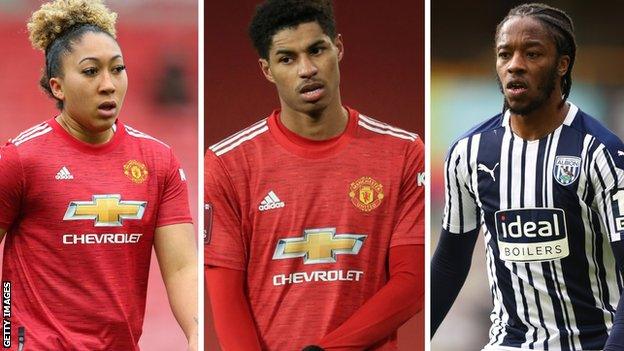Twitter and Facebook told to 'go further' by football authorities
- Published

Lauren James, Marcus Rashford and Romaine Sawyers have all received abuse on social media in recent weeks
Twitter and Facebook have been told to "accept responsibility for preventing abuse" and "go further than you have promised to do to date" amid continued online abuse of footballers.
Some of football's governing bodies have written a joint letter to Twitter boss Jack Dorsey and Facebook founder Mark Zuckerberg.
They have set out steps they want enforced on the platforms.
"The reality is your platforms remain havens for abuse," the letter says.
"Your inaction has created the belief in the minds of the anonymous perpetrators that they are beyond reach. The relentless flow of racist and discriminatory messages feeds on itself: the more it is tolerated by Twitter, Facebook and Instagram, platforms with billions of users, the more it becomes normal, accepted behaviour.
"The targets of abuse should be offered basic protections, and we ask that you accept responsibility for preventing abuse from appearing on your platforms and go further than you have promised to do to date."
The letter is signed by the Premier League, English Football League, women's professional game, Professional Footballers' Association, League Managers' Association, Professional Game Match Officials' Board and anti-discrimination charity Kick It Out.
"We write to ask that for reasons of basic human decency you use the power of your global systems to bring this to an end," it says.
Footballers including Manchester United's Marcus Rashford and Axel Tuanzebe, West Brom's Romaine Sawyers, Chelsea full-back Reece James and Manchester United forward Lauren James have been sent abusive online messages in recent weeks.
On Wednesday, Swansea City midfielder Yan Dhanda was abused following his team's FA Cup match against Manchester City.
Earlier this week, Premier League referee Mike Dean notified police after his family received death threats.
Facebook 'horrified' by online abuse of footballers - head of content policy Fadzai Madzingira speaks to BBC sports editor Dan Roan
The Football Association has called for action from the government, which has since stated social media companies could face "large fines" potentially amounting to "billions of pounds" if they fail to tackle abuse on their platforms.
The FA's director of equality and diversity Edleen John said she understands some players would want to stop using social media as a result of racist abuse.
But she added: "I don't think people should feel bullied off these platforms because companies are not taking accountability and responsibility for the part they have to play in society and frankly for the significant level of damage they are allowing to be inflicted on individuals, players, match officials and their family members."
On Wednesday, Facebook told BBC Sport it was "horrified" at the continued abuse and announced what is says are tougher measures to tackle the issue.
Twitter has previously said: "Racist behaviour has no place on our service and when we identify accounts that violate any of the Twitter Rules, we take enforcement action.
"We have proactively engaged and continue to collaborate with our valued partners in football to identify ways to tackle this issue collectively and will continue to play our part in curbing this unacceptable behaviour - both online and offline."
"We note the current assurances from Facebook that standards will be tightened, but far more is needed to drive change," the letters adds. "We call for meetings with your organisations to discuss the evidence of abuse on your platforms, the action you are taking, and how you plan to directly address the matters outlined."
What does football want?
The letter calls on the social media companies to:
Filter and block posts and messages before they are sent if they contain racist or discriminatory material.
"Operate robust, transparent, and swift measures" to take down abusive material if it is circulated.
An improved verification to allow for "accurate identification" of the user if required by the police.
Stop users who have previously sent abuse from re-registering an account.
For the platforms to "actively and expeditiously" assist authorities in identifying abusers.
"We, the leaders of the game in English football, will do everything we can to protect them, but we cannot succeed until you change the ability of offenders to remain anonymous," the letter adds.
Facebook has said it will change the rules governing direct messaging on Instagram, a platform it also owns.
As part of that it will disable the accounts of those found to have repeatedly sent abusive private messages on Instagram. But it would not spell out how many offences would trigger removal as offenders could use the information to "game the system".
It also says asking users to provide verification documents would prove challenging in communities where such documents would not be readily available.
Some users have sought a ban on specific emojis commonly used in racist messages but UK head of content policy Fadzai Madzingira has argued against banning symbols that could be used innocently in other contexts.
She also said filters could be used to prevent others from leaving offensive comments on posts, and that work was also being done to prevent banned users from opening new accounts.